Classic Movie Review: 'After Hours'
After Hours is the classic on the next I Hate Critics Movie Review Podcast.

After Hours (1985)
Directed by Martin Scorsese
Written by Joseph Minion
Starring Griffin Dunne, Rosanna Arquette, Teri Garr, Cheech and Chong
Release Date September 13th, 1985
Published October 22nd, 2023
The tracking shot that opens Martin Scorsese's black comedy, After Hours, is relatively meaningless. It's just a neat visual way to end up with the camera pointing to our protagonist, Paul Hackett. This is a valid cinematic choice, no criticism there. That said, as a student of opening scenes, I am a little bummed out. In my last exploration of a Scorsese classic, The Age of Innocence, Scorsese's camera opened on flowers under the credits and in the opening moment, a flower given from a performer on stage to another. The flower imagery in The Age of Innocence was the underlying theme of the movie.
Perhaps, the vacuousness of the tracking shot in After Hours is a reflection of Paul's own vacuousness. Paul Hackett is the main character, played by Griffin Dunne. Under the credits, we're hearing Mozart's Symphony in D Major No. 45. The symphony has little to do with the story either but it is beautiful and Paul is a handsome guy so, if I am going to read too much into every second of After Hours, perhaps these two surface level observations combined with the meaningless tracking shot crashing on Paul's face, is all to add up to how empty the character of Paul is and how his descent into a world of madness will only underline how Paul prefers being an empty vessel of capitalist exploitation to the alternative of actually living a life, as messy and problematic as that can be.
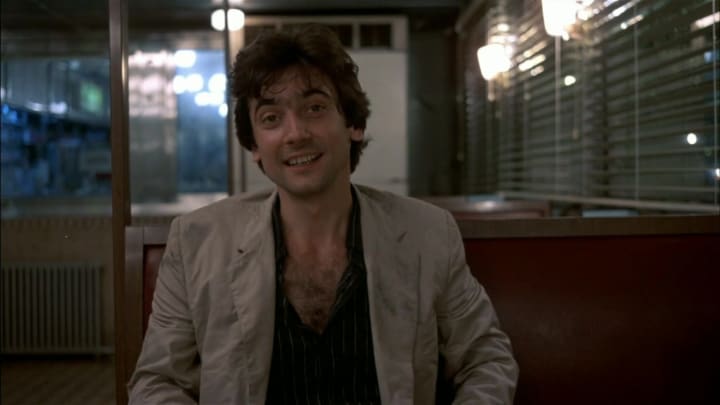
As Paul Hackett's co-worker Lloyd, played in a brief cameo by Bronson Pinchot, prattles on about how he wants to get into publishing and doesn't plan on doing this job that Paul is teaching him in this scene, for very long, Paul is struck by the co-worker's words. He stops listening almost immediately, this man having a plan and goals in life, has Paul searching the world around him for a meaning. As the co-worker goes on about getting into publishing, Paul's eyes fall on everyday office stuff before finally landing briefly on a shot of a birthday calendar, and a picture of a child on a co-worker's desk. The story of a person with a family, a life away from work, is what jars Paul back to reality and the reality that his new co-worker doesn't realize he's hurt Paul's feelings a little, just enough to make him not pay attention before awkwardly excusing himself.
The deck is beginning to stack. The conversation with Paul's co-worker is underlying a theme that will become clear, Paul doesn't have a life outside of work. He has no family, no girlfriend, he doesn't even seem to have friends, or, at least, he doesn't make it plain that he has anyone he can call on a Friday night. As Paul leaves work, he's just another lonely face in the crowd, so insignificant that the gates closing his office nearly close on him, and he narrowly slips through as men are closing them. All the while, another, more melancholic, classical music piece plays on the soundtrack. The giant golden gate doors close, and Paul is made smaller by their massive size in a striking visual. Note, these are golden gates.

In the next moment, we are now in Paul's apartment. It's spare, white with brown furniture and some posters on the wall that make his apartment look like a hotel room, impersonal, empty, reflective of the man himself in a very, very sad way. In his rumpled suit, Paul surveys his tiny, boring apartment, and seems to be reflecting about what happened in the previous scene, not seething over his co-workers, accidentally insulting conversation, but about the lack of so much that that conversation and perhaps that co-worker's desk with the picture of a child and a birthday calendar on it, reflect what he doesn't have in his own life, ambition and someone to share a dream with. The set piece ends with that emblem of visual emptiness in one's life, Paul flipping channels on a television.
Henry Miller's novel Tropic of Cancer takes center stage in After Hours as the scene shifts to Paul, reading, alone in a diner. Tropic of Cancer is about the struggles of Miller being a writer in Paris in the 1920's and 30s. It was banned for a time in the United States due to its frank sexuality and how it supposedly questioned the moral codes of the time, it was 1938 when it was banned. Tropic of Cancer is about a man struggling and still having a lot of sex, if you want to boil it down to the bare essentials. Thus, it's perfect for Paul, he's also struggling, and he'd like to have sex if the opportunity would arise which it is about to do as he meets Marcy (Rosanna Arquette).
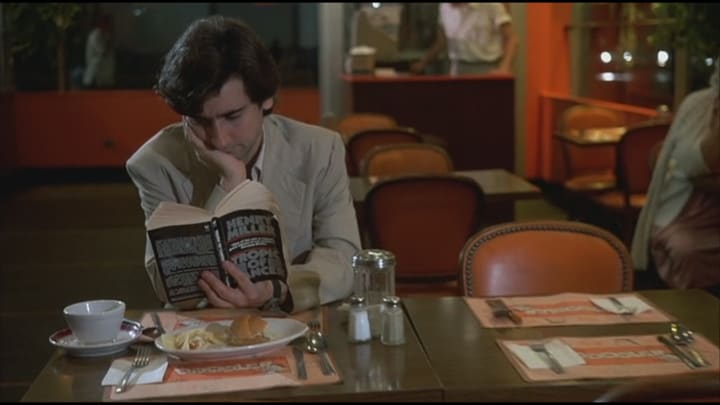
“This is not a book in the ordinary sense of the word. No, this is a prolonged insult, a gob of spit in the face of art, a kick in the pants to God, Man, Destiny, Time, Love, Beauty... what you will.”
That's a line from Tropic of Cancer and a line stated aloud by Marcie as she's introducing herself to Paul via a shared appreciation of Henry Miller's novel. The line "This is a prolonged insult," sticks out to me. Is After Hours, after all, little more than a prolonged insult to Paul. Everything that happens to Paul for what remains of this story is Paul at the center of a cosmic joke being played on him by the cruel master, Scorsese. Paul has chosen to live a life of emptiness, a life lacking meaning. He finds comfort only in the tedium of his office job. Scorsese peers down at him, literally in the director's cameo, later in the film, judging him for not having a goal, a desire, and seeming to demand that the world around him give him a life rather than pursuing one for himself.
Now, he does seem to pursue a life after getting Marcie's phone number, calling her, and arranging a late-night date. But as the dialogue reflects, Paul is still expecting the world to give him something he wants rather than him doing something to get it. He's going to Marcie's with the expectation of sex, the expectation that she will be his companion. When Marcie proves to have an entire life aside from this moment with Paul, he becomes upset and uptight and angrily rebukes her, leaving just as they were beginning to become intimate. He's offended that she's lived a life of sex and messy relationships, and the kinds of experiences that Paul has seemingly never had.

“I’m an egotist, but I’m not selfish. There’s a difference. I’m a neurotic, I guess. I can’t stop thinking about myself. It isn’t that I think myself so important... I simply can’t think about anything else, that’s all. If I could fall in love with a woman that might help some. But I can’t find a woman who interests me.”
This is another small passage from Tropic of Cancer and it feels notable here in this examination of After Hours. Like Miller's protagonist, Paul too is an egotist, he can't stop thinking about himself. Everything is about him, his plight, his desire, his crises. When others try to assert themselves in conversations, Paul is deeply dismissive, even angry. There is a running sort of gag in the movie about how people start talking about themselves almost at random as they meet Paul. He's oblivious to them and it's as if we've missed part of a conversation. There is a purpose to this, Paul isn't listening.
Take for example, when Paul meets Gail (Catherine O'Hara). He's just gotten money that could get him a cab that could get him out of Soho where he's been stranded on this evening after his encounter with Marcie, her death by suicide, a strange encounter with a bar waitress, Julie (Teri Garr), and hiding from a mob of people who think he may be a burglar. He's about to grab a cab when his money is taken by the cabbie who leaves him behind. Gail, who cut Paul's arm with the door as she was exiting this cab, insists upon cleaning up Paul's wound. He agrees, he wants to use her phone.
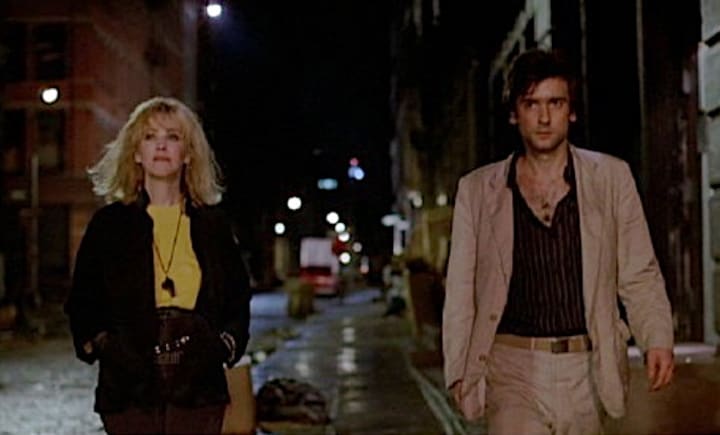
Apropos of nothing, Gail starts talking about how she drives a Mister Softee truck. This is seemingly random, but I believe it is part of a conversation she thought that they were having. The key is, we are fully in Paul's perspective and other people, don't fit that perspective. Other people occasionally interject but Paul is only about the moment he is in, his need, his desire, he's not listening, he doesn't pay attention, everything is about what he's thinking and that's why other people in After Hours perhaps feel off-kilter, if Paul were paying attention, being present for his part of any interaction, it might not seem so awkward when people mention things about themselves.
“I've lived out my melancholy youth. I don't give a fuck anymore what's behind me, or what's ahead of me. I'm healthy. Incurably healthy. No sorrows, no regrets. No past, no future. The present is enough for me. Day by day. Today!”
Another few lines from Miller's novel and another good description for Paul. He's a healthy, relatively young man with no plans for the future, no goals, no life to speak of. He does have today; however, he has the moment that he's in. He remains, throughout the story, stuck in his present state. He falls into traps and manages to escape only to fall into another and another and he refuses to think of anything other than himself, his immediate predicament and his particular desire in that moment. If you are wondering why this is a bad thing, you may be an egotist. Refer to my previous citing of Miller and Tropic of Cancer.
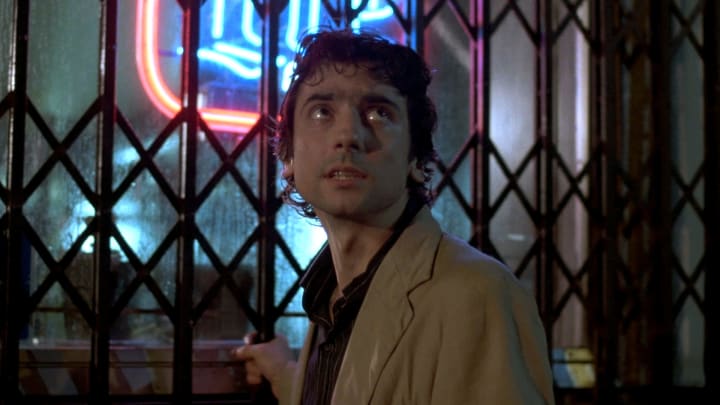
“I made up my mind that I would hold onto nothing, that I would expect nothing.”
Tropic of Cancer again, and another quote that unlocks more about Paul Hackett, a man who has made up his mind and expects nothing, he has nothing. Paul ends the movie exactly where he began the movie, at his desk, his computer being the one thing in the movie that offers him comfort, "Good Morning Paul," the computer screen says. And that speedy tracking shot from the start of the movie tracks its way back away from Paul, down the hallway and the story comes to a close. Paul's life is one where it is better to expect nothing and want nothing. And his journey reflects how when he wanted something, everything fell apart, it was hard, messy, and there were other people to contend with. And that's just a sad state of affairs. His cocoon of egotism is preferable to Paul than having a life where the messiness of other people might encroach on his comfort.
The story of Tropic of Cancer is not a one-to-one comparison to After Hours. Rather, it's more of a philosophical reflection via some of Miller's more iconic and quotable lines that add up to who Paul Hackett is. Paul Hackett is a surface level observation of the emptiness of pursuing nothing, wanting, nothing and accepting meaninglessness as a central component of your life. Paul's job is his sad destiny, it's a place where he will live out a life of empty comfort, it's a purgatory of his own creation. Paul is dead. He died before we met him and the end is Paul accepting his fate, realizing his symbolic death and accepting his place in purgatory. He attempted a journey out of purgatory but longed to return to it and then did. Life, real life, with its messiness and unexpected twists and turns was too much for Paul Hackett, purgatory, emptiness and the beat of his own heart, his only company.

“I need to be alone. I need to ponder my shame and my despair in seclusion; I need the sunshine and the paving stones of the streets without companions, without conversation, face to face with myself, with only the music of my heart for company.” Henry Miller "Tropic of Cancer."
Face to face with myself. This is a recurring motif in After Hours. Each time Paul is faced with a new place, he seeks a mirror to contemplate himself. He stares at his own face in silence and sets about his self-focused goal, his desire to return to a place where he is face to face only with himself, contemplating his shame and despair for an eternity. Tropic of Cancer is a road map to After Hours but it's only Cliff's Notes and in a way, so is Paul Hackett, a man whose life can be summed up in a series of Henry Miller quotes out of context, well presented, but not a strong approximation of what Tropic of Cancer truly is. Paul is forever an incomplete work of art, one abandoned to live forever as a collection of lifted ideas from other sources and empty its shallow core.
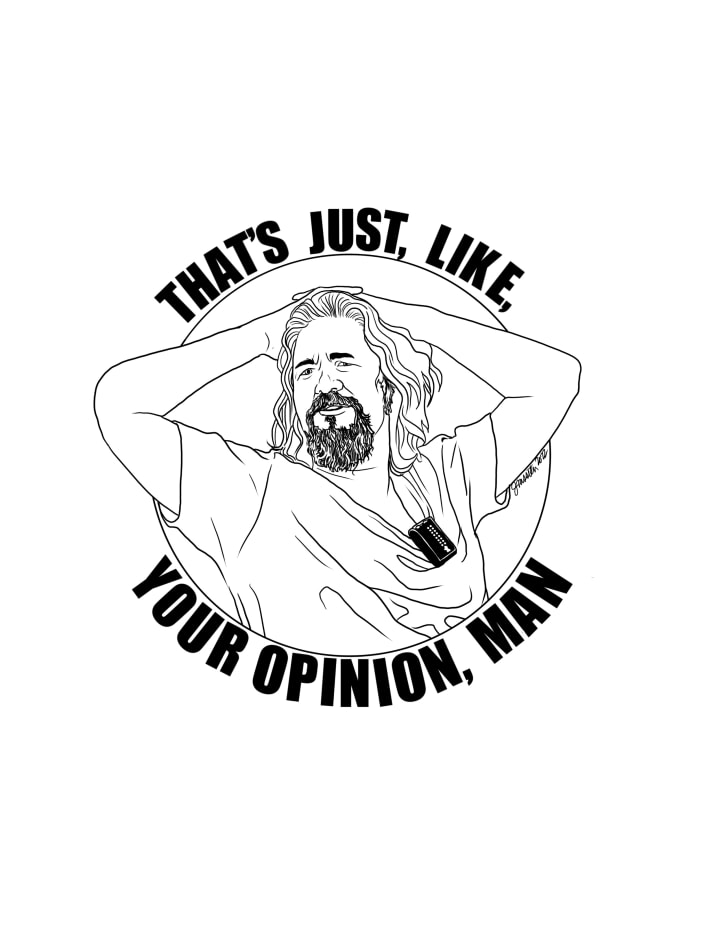
Find my archive of more than 20 years and nearly 2000 movie reviews at SeanattheMovies.blogspot.com. Find my modern review archive on my Vocal Profile, linked here. Follow me on Twitter at PodcastSean. Follow the archive blog on Twitter at SeanattheMovies. Listen to me talk about movies on the I Hate Critics Movie Review Podcast. If you have enjoyed what you have read, consider subscribing to my writing on Vocal. If you'd like to support my writing you can do so by making a monthly pledge or by leaving a one time tip. Thanks!
About the Creator
Sean Patrick
Hello, my name is Sean Patrick He/Him, and I am a film critic and podcast host for the I Hate Critics Movie Review Podcast I am a voting member of the Critics Choice Association, the group behind the annual Critics Choice Awards.
Reader insights
Nice work
Very well written. Keep up the good work!
Top insights
Easy to read and follow
Well-structured & engaging content
Expert insights and opinions
Arguments were carefully researched and presented
Eye opening
Niche topic & fresh perspectives
Heartfelt and relatable
The story invoked strong personal emotions
On-point and relevant
Writing reflected the title & theme






Comments (1)
I loved the film back in the day, and I am still surprised how often I have to tell people about it...and that it is a Scorsese film! Thank you, sir!